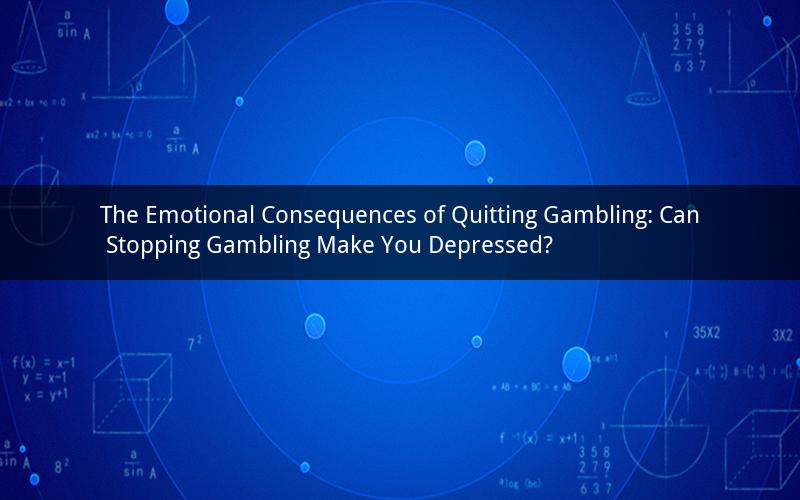
Introduction:
Gambling has been a popular pastime for centuries, offering excitement and the chance to win big. However, for some individuals, it can become an addiction that leads to serious consequences. One of the most concerning aspects of quitting gambling is the potential emotional impact, with some people experiencing depression. This article explores the relationship between stopping gambling and the risk of depression, highlighting the emotional consequences and offering ways to cope with them.
1. Understanding the Link Between Gambling and Depression
Gambling addiction and depression often go hand in hand. Individuals who struggle with gambling may turn to it as a way to cope with feelings of sadness, anxiety, or boredom. The thrill of winning can temporarily alleviate these negative emotions, creating a cycle of dependency. When someone decides to quit gambling, the sudden absence of this coping mechanism can leave them vulnerable to depression.
2. The Emotional Consequences of Quitting Gambling
When someone stops gambling, they may experience a range of emotional challenges. These can include:
a. Withdrawal Symptoms: Similar to other addictions, quitting gambling can lead to withdrawal symptoms, such as irritability, anxiety, and restlessness. These symptoms can be intense and overwhelming, making it difficult for individuals to cope.
b. Sadness and Regret: Stopping gambling may bring up feelings of sadness and regret, especially if the individual has lost significant amounts of money or damaged relationships. The realization of the consequences of their actions can be emotionally taxing.
c. Loss of Identity: For some individuals, gambling has become a significant part of their identity. Quitting gambling may lead to a loss of purpose and a sense of emptiness, as they struggle to find new interests or activities to replace their gambling habits.
3. Coping with Emotional Challenges
To cope with the emotional consequences of quitting gambling, individuals can consider the following strategies:
a. Seeking Support: Joining a support group or seeking therapy can provide individuals with a safe space to share their experiences and receive guidance. Sharing with others who have faced similar challenges can be comforting and empowering.
b. Developing New Hobbies: Finding new activities or hobbies that provide fulfillment and joy can help individuals replace the void left by gambling. Engaging in physical exercise, learning a new skill, or pursuing a creative endeavor can be beneficial.
c. Setting Goals: Setting realistic goals and celebrating small achievements can help individuals stay motivated and focused on their journey towards recovery. This can include setting financial goals, personal goals, or goals related to their mental and emotional well-being.
4. The Importance of Professional Help
While support groups and self-help strategies can be beneficial, it is essential to recognize the importance of seeking professional help. Therapists, counselors, and addiction specialists can provide tailored guidance and support to individuals struggling with gambling addiction and depression. They can help individuals develop coping mechanisms, address underlying issues, and create a personalized recovery plan.
5. The Road to Recovery
Recovering from gambling addiction and the associated depression is a journey that requires time, patience, and commitment. It is crucial to remember that setbacks are a normal part of the process. By seeking support, developing healthy coping strategies, and seeking professional help when needed, individuals can overcome the emotional challenges associated with quitting gambling.
FAQs:
Q1: Can stopping gambling make you depressed?
A1: Yes, stopping gambling can indeed make you depressed. The sudden absence of the coping mechanism provided by gambling can lead to emotional challenges, including sadness, anxiety, and withdrawal symptoms.
Q2: How long does it take to overcome the emotional consequences of quitting gambling?
A2: The duration of overcoming the emotional consequences of quitting gambling varies from person to person. Some individuals may experience challenges for a few weeks, while others may require months or even years to fully recover.
Q3: Can therapy help with the emotional consequences of quitting gambling?
A3: Yes, therapy can be highly beneficial in addressing the emotional consequences of quitting gambling. Therapists can provide tailored support, coping strategies, and a safe space to explore underlying issues.
Q4: Are there support groups available for individuals struggling with gambling addiction and depression?
A4: Yes, there are numerous support groups available for individuals struggling with gambling addiction and depression. These groups provide a sense of community, support, and shared experiences.
Q5: How can I develop new hobbies to replace gambling?
A5: Developing new hobbies can be a great way to replace gambling. Consider activities that you enjoy or have always wanted to try, such as physical exercise, learning a new skill, pursuing a creative endeavor, or joining a club or group with shared interests.